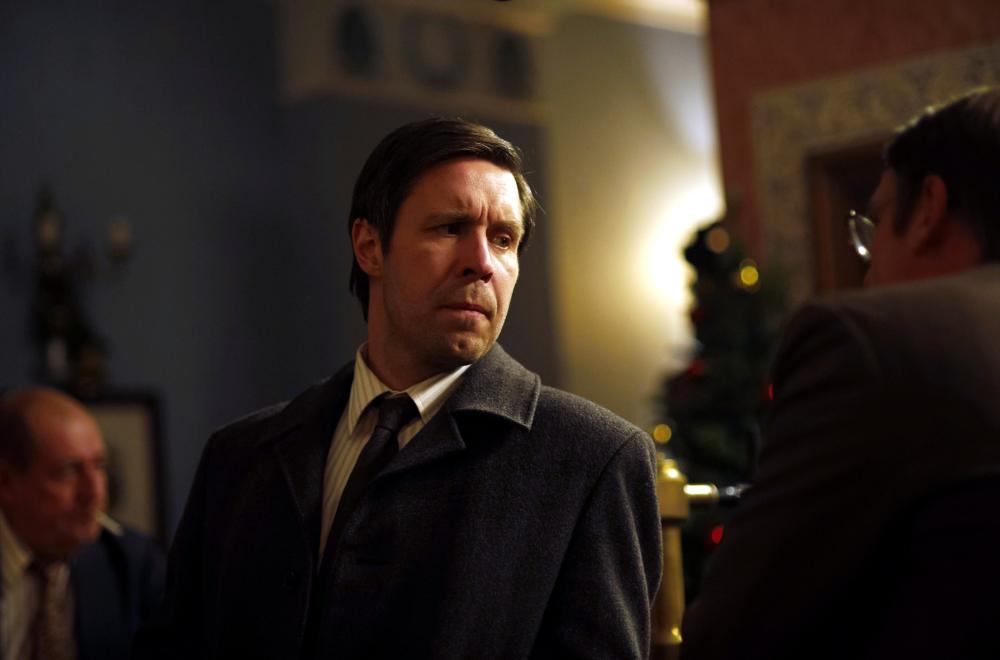By Chlotrudis Independent Film Society
Director: James Marsh
Starring: David Calder | John Fox | Maxine Peake | Nicholas Woodeson | Paddy Considine | Ron Cook | Warren Clarke

Country: united_kingdom
Year: 2010
Running time: 93
IMDB: http://www.imdb.com/title/tt1260581/
Jason says: “David Peace’s Red Riding novels are described as a quartet, and if you look at the titles to the filmed RED RIDING HOOD TRILOGY, there’s clearly a hole where 1977 should be. For whatever reason, screenwriter Tony Grisoni and the producers decided to skip that one, and though its events are referred to in 1980, it is by no means critical to understanding that year’s story. (NOTE: Although I will attempt not to give away too much of 1974 in reviewing 1980, just the presence or absence of certain characters may be considered a spoiler; continue reading at your own risk.)
“There is a new serial killer loose in northern England, this one called ‘the Yorkshire Ripper,’ targeting women rather than children. After a disastrous news conference by the local superintendent, the Home Office chooses to send outside help, in the form of star Manchester detective Peter Hunter (Paddy Considine), and his hand-picked team. Investigating the Ripper is not Hunter’s only task – he is also to find proof of the corruption in the West Yorkshire police force. It’s not like this is his first go-round with that, either; he had previously been brought in to investigate the 1974 Karachi Club shootings – and one of the key figures in that case, Bob Craven (Sean Harris), is his liaison on the new one.
“Even more than with 1974, the murder mystery aspect of Red Riding: 1980 is somewhat incidental. It’s about the difficulty of making a dent in a corrupt system, especially when you have your own weaknesses. For instance, Helen Marshall (Maxine Peake), a fellow detective that Hunter had an affair with a year ago and whom he requested as part of his team. And even if Hunter were able to completely separate himself from that temptation, the two investigations are entangled in intriguing and frustrating ways: Not only will any attempt to investigate the corruption potentially alienate Hunter from his West Yorkshire colleagues, but Helen soon discovers hints that one of the Ripper murders may not be what it appears to be.
“Paddy Considine’s Hunter is our window into the case this time around, appearing in almost every scene. Hunter is widely perceived as a rising star, and Considine for the most part plays him as what we hope a rising star would be: Human enough with civilians to make up for the slight air of superiority he gives off at work, but which he can get away with because he is intelligent, professional, organized, and righteous. Indeed, Considine gives Hunter such a clear sense of rectitude that it might take a while for us to watch Hunter’s interactions with Marshall and realize that he’s the one that’s acting kind of weird and inappropriate, not her.
“Peake is excellent as well; she makes Helen Marshall businesslike without her ever seeming remote or stiff. We’re well aware that she’s unusual as a woman in this world, just looking at the cast, but one or two comments aside, we almost always note her intelligence first. A couple of other performances that stand out are by people who were present in 1974, but easily discounted in that film: Sean Harris and Tony Mooney as Craven and Douglas. In the first movie, they mainly served as Dawson’s enforcers, and the bulkier Douglas seemed the more dangerous of the two; here, only Craven remains on the force, and it clearly eats at Douglas. Mooney doesn’t quite make the character sympathetic, and he probably shouldn’t, but he’s certainly interesting to watch; it’s an odd thing, seeing bitterness drive someone to potential redemption. Harris, meanwhile, gets a character he can attack with gusto; Craven was basically muscle five years ago but acts like cock of the walk now. He drops sarcasm with smarmy perfection and manages to make the man both an exceptional threat and just one more symptom of the disease.
“Director James Marsh is likely best known for his Oscar-winning documentary MAN ON WIRE, but the feel of this one is far removed from that playful story. What 1980 does have in common with good documentary work is how he and screenwriter Tony Grisoni are careful about doling out information; we’ll get little bits of it at first, just enough so that when the bombs are dropped, they’re not completely out of the blue but they’re surprising enough to still send shockwaves. Flashbacks to Hunter’s first visit to West Yorkshire are used sparingly, in part to make sure that the moment when we realize just how closely this story and 1974 are connected has maximum impact. He manages to make another moment disorienting by just how low-key it is; watching it, we realize it should be bigger, but our focus has shifted.
“Even without that moment, though, 1980 is a fine bit of storytelling, one which can likely stand well enough on its own. It’s a bit more intellectual than the raw emotion of 1974, but the pairing of the two approaches works, making the monster that is the corrupt police department look all the more impregnable.”
